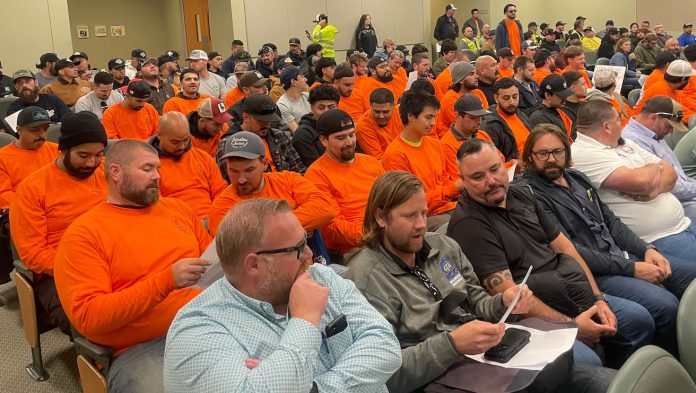
The Watsonville City Council on Tuesday delayed a decision on changing the Project Labor Agreement (PLA) they have with local unions to perform large infrastructure projects, but not before a contentious hearing that packed the meeting chambers with union workers.
The issue will return to the council on Nov. 5 during a special meeting to give city staff and union representatives time to hone the agreement.
A PLA is an agreement between the city and the trades councils that sets out terms and conditions for workers on city construction projects.
Last updated in 2014, the current PLA requires that the city use local union workers for projects that exceed $600,000 and involve three or more trades. It also lacks an expiration date.
Union officials see such agreements as a way to assure their members get work and receive fair pay, among other things.
But city staff told the council that the current PLA hinders many vital city projects from getting completed, since contractors are reluctant to make bids when faced with the strict requirements of the agreement.
This includes the Corralitos Creek Water Treatment Plant Project, which had a $3 million engineer’s estimate but was hamstrung by a $5.1 million contractor’s estimate.
The Water Well #4 Pump Station, estimated to cost $3 million, was similarly sidelined when it received a $5.6 million bid, 69% above the estimate. The city received no bids on the $1.3 million Miles Lane Sewer Pump Station.
With a limited pool of contractors able to do the specialized water infrastructure work—coupled with a strict PLA—it drives up the bid amounts and blocks the city from being able to award the contracts, Public Works Director Courtney Lindberg said.
“I can’t get work done if no one bids on projects,” she told The Pajaronian.
Another problem, Lindberg said, is that non-union contractors hoping to bid on a city project governed by a PLA are required to use union workers instead of their own, and to pay for union dues and benefits.
“It just destroys your profit margin,” Lindberg said. “You can do it, but why would you? You’re going to lose money.”
Lindberg stresses that she is not anti-union, and points to three of them that work with her department.
Granite Construction and Graniterock, both of which are union shops, perform road projects in the city, she said.
But when she started two years ago, there was a 10-year backlog of water projects, Lindberg said.
Casey Van Den Heuvel, who serves as CEO of the Monterey/Santa Cruz Building and Construction Trades Council, said that the city’s explanation doesn’t tell the full story.
He explained that engineers’ estimates often come six months to a year before the bidding process opens. That’s a problem in a volatile market where prices are always fluctuating.
In addition, jurisdictions frequently pay engineers to design only 60% of a given project. When contractors later present the full estimated cost for the final bid, therefore, the jurisdictions are left unable to afford it.
That can wreak havoc on a project he said, pointing to the now-canceled Nature Center at Ramsay Park.
The engineer’s estimate for that project, he said, had 142 clarifying questions from contractors.
“These (aspects) were all left out of the plans, because they didn’t pay for fully engineered ones,” he said.
This creates a “perfect storm” for going over the engineer’s estimate, Van Den Heuvel said.
City staff was asking the council to rescind the PLA and raise the threshold from $600,000 to $1.5 million.
In addition, instead of requiring a PLA, it would trigger one only if a given project meets certain requirements.
The changes also included a three-year expiration date for PLAs, after which they would be renegotiated.
In addition, the proposal calls for carve-outs for water and wastewater treatment projects, which have different technical standards than other infrastructure projects.
A separate provision would allow the city to rescind the PLA for a specific project if it is preventing important projects from getting completed.
Councilman Jimmy Dutra said he agreed with the changes.
“Projects in the city of Watsonville are not getting done,” he said. “My priority is the people that live in this community, and if you live in this community, you are going to want your infrastructure to be updated.”
But Councilwoman Ari Parker expressed concern that a definitive PLA was not in place if the council voted to rescind the existing one.
“I don’t want to do anything with this PLA until we have a completed PLA to replace it,” she said.
Moving forward without a suitable framework amenable to both sides, she said, can cause problems that last for years.
“I’m not comfortable with that at all, for what we need to do to build a future for Watsonville,” she said.
Van Den Heuvel was also hoping the city would agree on the formation of a joint administrative council made up of equal parts trade members and city staff to hammer out disagreements with projects, a proposal Councilwoman Kristal Salcido opposed.
She explained that such a requirement would delay the process.
“We need to be able to promptly bid out things that don’t have an appropriate number of bids,” she said.
Van Den Heuvel said he is willing to work with council members and city staff to hammer out an agreement.
“I’m willing to customize a project labor agreement that brings benefits to this community, makes sure we’re enforcing those apprenticeship standards, making sure we’re enforcing those prevailing wage laws to fit the area,” he said. “But I can’t do that when I’m climbing a wall when someone doesn’t want to make any changes themselves.”












